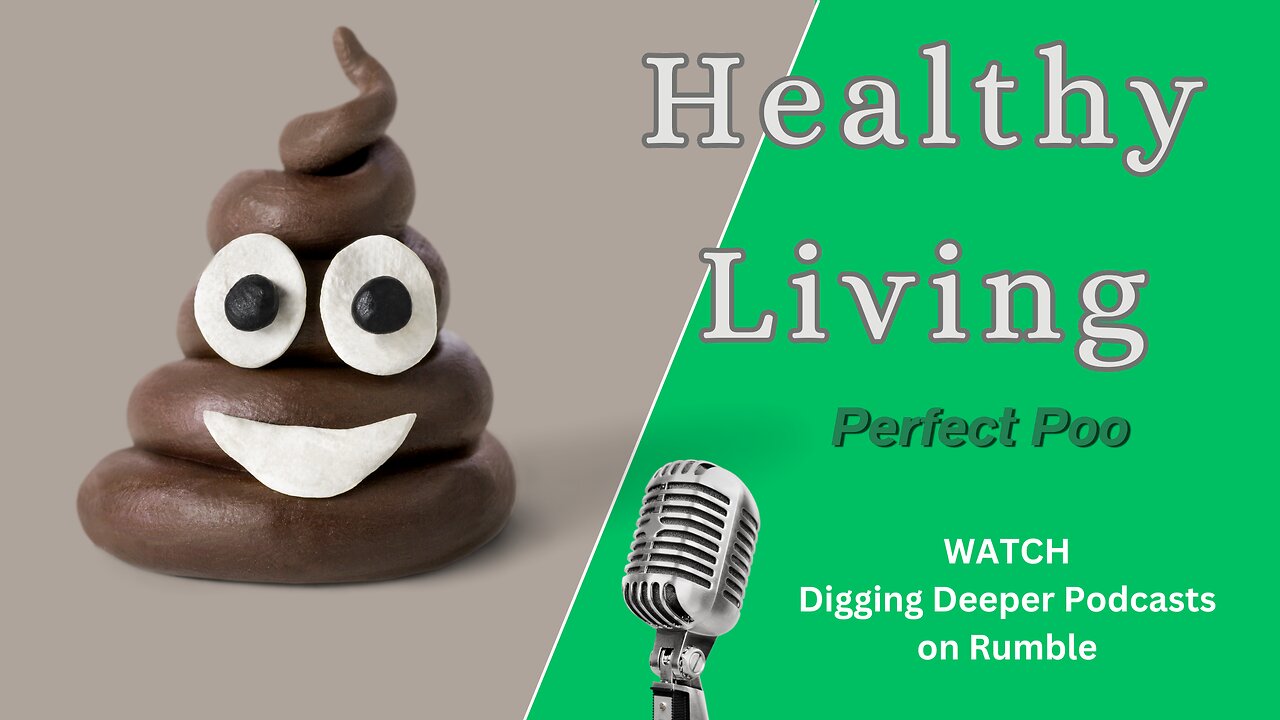Premium Only Content

Healthy Living; Perfect Poo
Your poo is the end result of your digestion, but your health begins in your gut.
Everybody poops, but nobody really talks about it. But while putting a lid on all potty talk may keep conversations civilized, it may mean we’re missing out on valuable clues to our health.
Your poop can tell you if you’re eating enough fiber and drinking enough water, or if your digestive system is processing food too slowly or too quickly. Also, lasting changes in your bowel habits or the appearance of your poop can be a sign of a medical condition that requires treatment.
Your poo is the end result of your digestion, but your health begins in your gut. It seems like maintaining a healthy gut is the new rage, so how do you know if your gut is healthy and how do you keep it that way?
What is a healthy gut?
Determining whether you have a healthy gut involves assessing various factors related to digestion, bowel habits, overall well-being, and the diversity and balance of your gut microbiome. While individual experiences may vary, here are several indicators that suggest you have a healthy gut:
Regular Bowel Movements
Absence of Digestive Discomfort
Diverse Diet Tolerance
Balanced Mood and Energy Levels
Strong Immune Function
Normal Weight Maintenance
Well-Being of Skin and Hair
Optimal Sleep Patterns
It’s important to note that individual experiences of gut health can vary, and occasional fluctuations in digestive function may be normal. However, persistent or severe digestive symptoms, changes in bowel habits, or other concerning signs should be discussed with a healthcare professional for proper evaluation and management.
How does poop demonstrate a healthy gut?
Poop, while often a subject of humor or discomfort, holds significant clues about our digestive health, particularly the state of our gut microbiome. The gut microbiome refers to the diverse community of microorganisms that reside in our digestive tract, including bacteria, viruses, fungi, and other microbes. These microscopic inhabitants play a crucial role in various aspects of our health, including digestion, immune function, and even mental well-being.
Here’s how poop can serve as an indicator of a healthy gut biome:
Consistency: The texture and consistency of stool can provide insights into the efficiency of digestion and absorption in the gut. Ideally, stool should be well-formed and easy to pass, indicating that the digestive system is functioning optimally. Loose stools or diarrhea may suggest an imbalance in the gut microbiome or issues with food tolerance.
Color: The color of stool can vary depending on factors like diet, hydration, and the presence of certain substances. Generally, a healthy poop color ranges from light to dark brown, reflecting the breakdown of bile pigments in the digestive process. Unusual colors like red (indicating blood), black (suggesting bleeding in the upper digestive tract), or pale (possible bile duct obstruction) may warrant further investigation.
Odor: While nobody enjoys discussing poop odors, they can provide valuable information about gut health. Normal stool typically has a mild odor due to the fermentation of undigested food by gut bacteria. Strong, foul-smelling stool could indicate an imbalance in the gut microbiome or the presence of certain infections or digestive disorders.
Frequency: Regularity in bowel movements is often considered a sign of good digestive health. While individual bowel habits can vary, most people pass stool anywhere from three times per day to three times per week. Consistent changes in bowel habits, such as increased frequency or constipation, may indicate underlying issues with the gut microbiome or digestive function.
Composition: Poop is composed of various elements, including water, undigested food particles, bacteria, and waste products. Analyzing the composition of stool can provide insights into the balance of beneficial and harmful bacteria in the gut microbiome.
pH Level: The pH level of stool can also offer clues about gut health. A slightly acidic pH (around 6.7) is considered normal and helps inhibit the growth of harmful bacteria in the gut. Significant deviations from this range may suggest imbalances in the gut microbiome or digestive disorders.
-
 15:47
15:47
Digging Deeper Original Podcasts
2 months agoVaccine War Headlines vol 97
801 -
 5:02:46
5:02:46
MoFio23!
13 hours agoNintendo Switch It UP Saturdays with The Fellas: LIVE - Episode #1
69.3K13 -
 4:26:49
4:26:49
BLoobsGaming
12 hours agoCan I get an Enhance Crystal Weapon Seed please!? MORE Corrupted Gauntlet
126K42 -
 7:35:05
7:35:05
BSparksGaming
23 hours agoDynamic Duo! Marvel Rivals w/ Chili XDD
79.6K -
 7:00:42
7:00:42
NellieBean
15 hours ago🔴 LIVE - trying some COD maybe Pals later
81K1 -
 1:47:46
1:47:46
SpartakusLIVE
12 hours agoThe Master RIZZLER has entered the building, the 95% REJOICE
35.4K3 -
 29:53
29:53
MYLUNCHBREAK CHANNEL PAGE
1 day agoOff Limits to the Public - Pt 1
97.5K150 -
 16:03
16:03
Tundra Tactical
14 hours ago $18.69 earnedNew Age Gun Fudds
149K20 -
 8:22
8:22
Russell Brand
19 hours agoThey want this to happen
227K466 -
 2:06:43
2:06:43
Jewels Jones Live ®
1 day ago2025 STARTS WITH A BANG! | A Political Rendezvous - Ep. 104
127K41